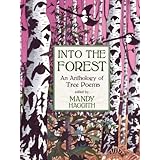 Into the Forest This was one of my favourite Christmas presents!
Into the Forest This was one of my favourite Christmas presents!
It is an anthology of poems about trees, inspired by and drawing on the work Mandy Haggith did as poet in residence in Edinburgh’s Royal Botanical Gardens in July 2013, and in keeping with her long-standing work in environmental conservation, she is donating royalties to the organisation Trees for Life – an organisation for which I have great sympathy and respect.
This book should not be seen as a fund-raiser, many examples of which produce nothing better than a rag-bag of more or less compatible poems demonstrating more good will than good judgement. Mandy Haggith’s own long ecological and poetic practice, her scientific training and her choice of the Gaelic Tree Alphabet to structure the book, have inspired and informed her selections, and her learned notes drawn from the folklore and cultures of many parts of the world, give the book a shape and coherence that it might otherwise have lacked.
The poems reflect a wide diversity of subjects, eras, forms, languages and themes. Scottish poetry is well-represented, and the Gaelic poems in particular are a delight. There are wll-known poets, like Seamus Heaney or Kathleen Jamie, Thomas Hardy and Robert Herrick, but also newer voices, like Judith Taylor, Chris Powici and Jane McKie. Sorley Maclean’s Hallaig is in it, and Sylvia Plath’s Blackberrying. The quality is sometimes a little uneven, but I wouldn’t have been without John Estabrook’s Tree Farm (which I first knew under the title Logs to Burn) although it is little more than doggerel. I was especially pleased to see how few poems are simply lyrical descriptions of well-loved trees, but deal with trees as symbols, settings, characters in their own dramas, as well as natural beings. Poems are dark, or complex or funny, scientific, magical or nostalgic. A poet’s response may be religious, political or personal as well as aesthetic. It makes for a rich mix, its potential for uncontroleed sprawl and tangle kept in check by careful editing, and excellent production.
Sometimes I feel that there is still a perception outside the poetry chatter, that poetry ought to be romantic lyrics about nature, and inside our little enclave, that eco or nature poetry is just a bit sentimental and lacking in intellect, innovation or engagement with ‘the real world’. This book disproves that, and though I hope that this anthology, which because of its subject matter, must appeal to a wider audience than the usual poetry suspects, will also prove to be a valuable introduction to new poets, new poetic forms, and new ways of dealing with old subjects.







